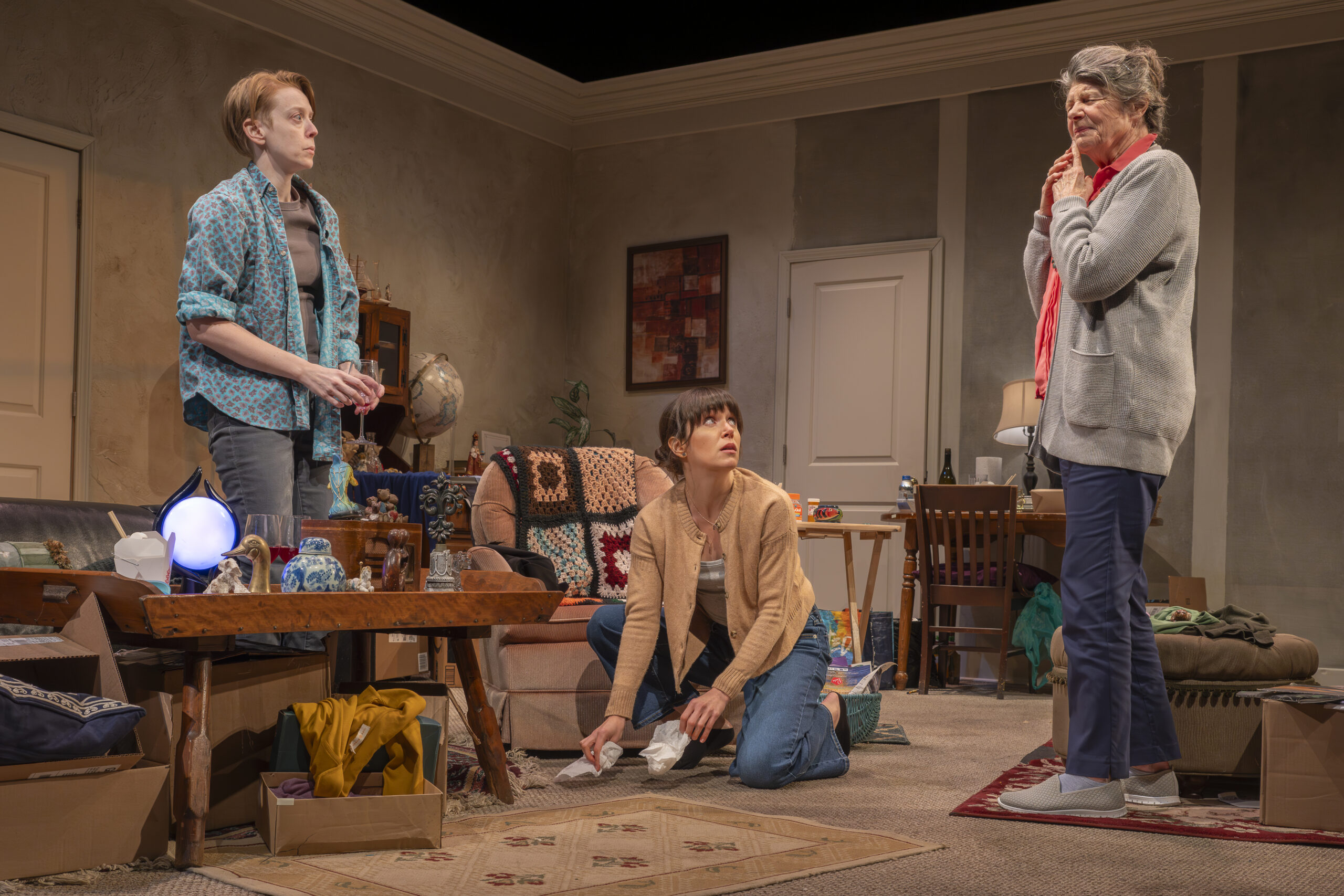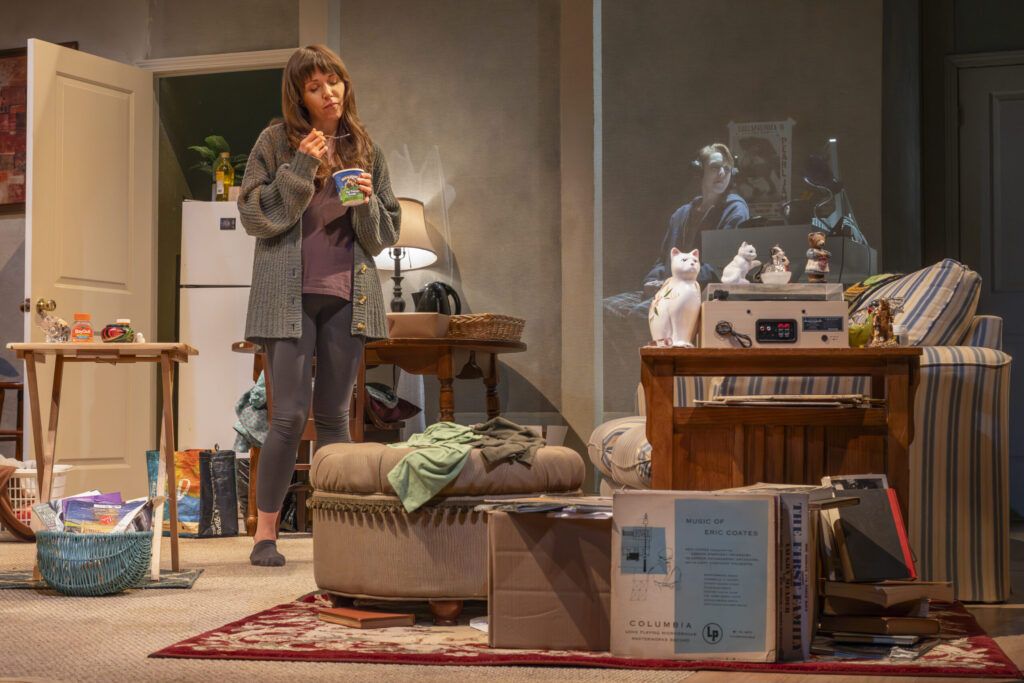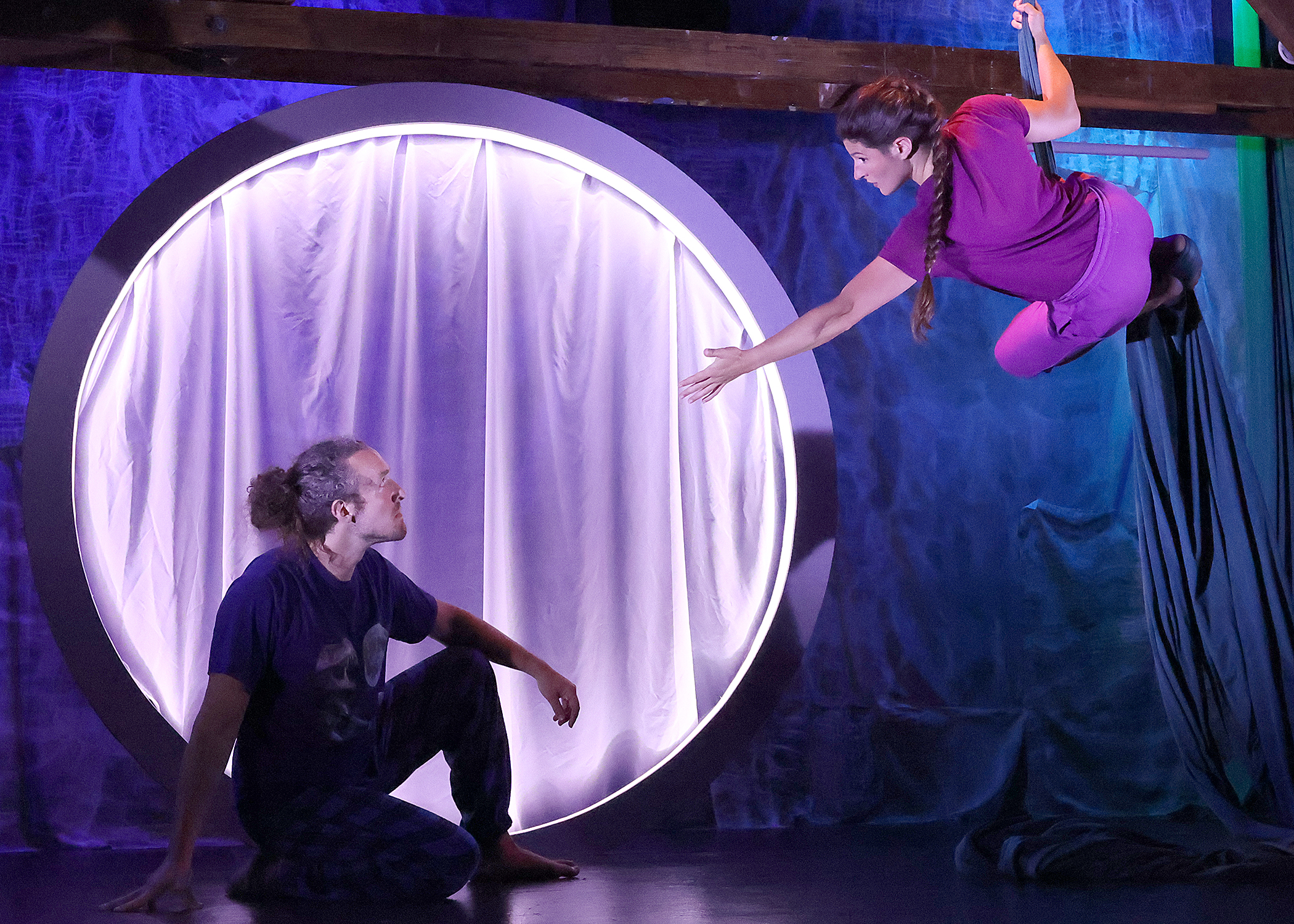
“Smart” at WHAT: Beautifully Chilling and Brilliantly Provocative

At a time when there are almost-daily reports of new and different ways artificial intelligence can change—and challenge—the way we live, I looked forward to the Wellfleet Harbor Actors Theater’s new production of Mary Hamilton’s Smart to issue a wry commentary on the growing ubiquitousness of AI devices in our daily lives.
But that wasn’t what happened; the technology, it turned out, was just one layer of a story that’s ultimately about where loneliness, isolation, and vulnerability can take people.
AI plays a role, of course. The play opens in a living-room whose mustiness you can almost feel, with crocheted afghans draped over every possible piece of furniture and other undefined stuff strewn around—it’s clear that if Ruth (Christine Farrell) isn’t a hoarder now, she’s well on her way there.
Which wouldn’t be her worst problem. The main issue here is that Ruth is experiencing dementia marked by aphasia, and it’s becoming increasingly clear to her daughter Elaine (Kea Trevett) that she’s unsafe alone. But Ruth won’t hear of live-in aides, who, she suspects, are stealing her cherished possessions, and so Elaine feels cornered. She’s given up one relationship already to become her mother’s part-time carer, and she has little hope of anything else coming her way.
In a desperate attempt to provide Ruth some help and even companionship—and buy herself time outside the apartment—Elaine brings home an Alexa-type device named Jenny, and Jenny immediately proves her worth by performing the basic AI tricks, playing music and turning lights on and off on demand.
While this is happening on the main stage, offscreen we see Jenny’s human backup, a “prompt engineer and librarian” named Gabby (Blair Baker), helping Jenny make sense of the data she’s absorbing and learn new and more refined responses. Gabby does this by listening in on Jenny’s milieu. Herself lonely and isolated, she develops a stalker-esque attachment to Elaine, telling her father during a phone call that she’s found a girlfriend, staying up late to keep pace with Elaine’s insomniac ramblings, eventually engineering a seemingly accidental meeting with Elaine in real life.

It’s possible that the play is meant to be about the intrusion of AI devices into our lives, and how seamlessly we welcome those intrusions (though when Elaine reflects in amazement about Jenny playing music on demand, Ruth does ask with surprising insight, “who ever said putting on a record is really hard?”), but it seems instead to underscore the minds behind the machines. There were stalkers long before the invention of the computer; probably before the invention of the abacus. The loneliness and need for connection and belonging that drives Gabby has nothing to do with Jenny’s ability to think or have agency; Jenny’s just a modern and more efficient bathroom window.
And as such, the play truly succeeds. Elaine and Gabby’s relationship is clearly doomed from the start, as it should be; but it has more to do with the terror of being alone and the consequent development of fantasies than it does with the actual technique by which the relationship came about. It’s tempting to see Gabby’s intrusions on Elaine’s privacy as an artifact of the power she has through her mad coding skills combined with her easy access to Elaine’s daily life, but that’s missing the real point.
The acting is wonderful. Both Farrell and Trevitt are reprising roles they originated when the play opened in New York (as is the scenic designer, Ant Ma, herself a wizard in using spaces to accommodate different aspects of the unfolding story), and both fully inhabit their characters. Farrell has a bewildered, disoriented charm, trying to bat the cobwebs away from her brain whilst achingly aware of what agency she’s lost and continues to lose. Trevitt’s Elaine is by turns exasperated and fed up, guilty and loving—a set of emotions that will ring true with any caregiver. And as the obsessed Gabby, Baker does seem to make understandable the claim that anything is better than being alone, even if it’s a relationship mired in unspoken secret knowledge and unequal terms.

But that doesn’t mean the play is without humor, or moments of warmth and even tenderness. When the two young women meet and begin to date, their dialogue is endearingly awkward and both actors bring a certain lithe physicality to their roles that contrasts strikingly with Farrell’s slow, befuddled movements.
A shout-out to the fourth actor not in the room, Sasha Diamond, the voice of the ever-present device: she makes Jenny sound amused and amusing, far too perky and far too helpful.
But the device shouldn’t overshadow the story—it is, pun pretty much intended, a device in both meanings of the word. Director Jess Chayes cuts neatly through the concerns many have about the dangers of AI and proves that it really is, always, the man behind the curtain we have the most to fear.
That said, the play will leave some audiences looking slightly askance at their own smart homes or phones when they leave the theater. And perhaps that’s not such a bad thing.
Review by Jeannette de Beauvoir
Images by Michael & Suz Karchmer
Smart
Wellfleet Harbor Actors Theater
June 6-23, 2024
More Recent Provincetown News




 Accommodations
Accommodations  Art
Art  Bars
Bars  Books
Books  Entertainment
Entertainment  Events
Events  Featured
Featured  Guides
Guides  History
History  Literary stuff
Literary stuff  Most Popular
Most Popular  Provincetown News
Provincetown News  Restaurants
Restaurants  Reviews
Reviews  Shopping
Shopping  Theatre
Theatre  Uncategorized
Uncategorized  Weed
Weed